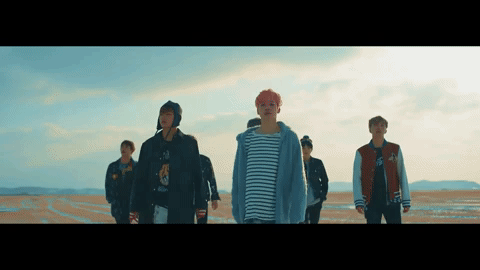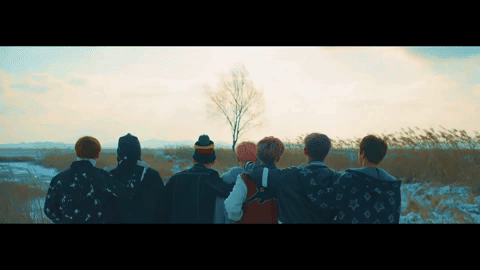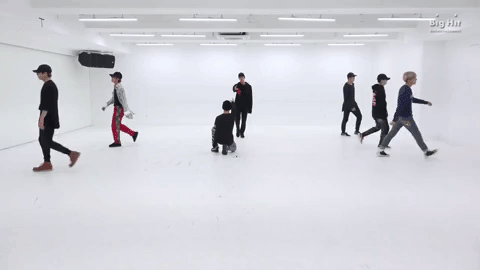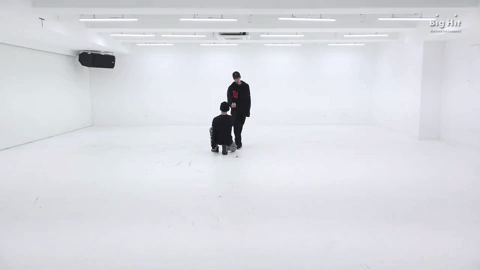Snowflakes, cherry blossoms, looking backwards, walking forwards: what’s happening in BTS’ “Spring Day”?
Note: The interactive components of this piece only work on laptop-sized screens.
Some weeks ago, I was standing in a store in New York when “Spring Day” by BTS came on. Although I don’t speak Korean, this song echoes within me with such clarity that I know most of the words, and so began to sing along under my breath. Next to me, a woman had also begun to sing, and when we both looked up and smiled at each other, I saw that she had begun to cry, and something about the song made me offer her my hand. The people accompanying us looked on in bewilderment, as if this were a strange thing to do, and yet, saying nothing, she took it and we laughed, shared a squeeze, one of her tears fell, and only then, still humming, did we let go.
“Spring Day” is arguably the most successful song by the septet BTS, arguably the most successful K-pop group of all time. The song topped every one of the eight major online streaming sites in Korea within an hour of its midnight-on-a-Monday release; MelOn, the most popular provider, began to generate errors under the heavy load. It won both “Song of the Year” and “Music Video of the Year” for 2017. And yet, “Spring Day” is not a prototypical pop hit. It’s neither a typical hype song nor a love song—it is postmodern, it is a song of lament, and for some reason, it is a smash hit.
Something happens to me when I listen to this song. Watch the music video. Does something happen to you, too?
We begin with loneliness. Jungkook, the youngest, stares out the window of a train while Jimin sits alone and stares out at sea. V is captured in the midst of a suicide attempt; he lays down on the tracks of an oncoming train. RM, standing by himself in a train carriage, sings the opening line: “I miss you.”
Saying it like this makes me miss you more
Even while I’m looking at your picture
I miss you (2)
He exits the train and walks into a hotel called Omelas. No vacancy, a sign reads. Inside, the boys of BTS are caught in the midst a food fight; in slow motion, Jimin throws a birthday cake at RM’s face. It cuts to a shot of the boys running up a stairwell while Jin, the oldest, stands at the its base. He stares up at them, then raises his hands as if he were about to take a picture. This is the first instance where it’s made clear that individual characterizations matter—as the oldest, Jin is the first who will be forced to say goodbye to youth; here is his attempt to immortalize it.
Back inside the Omelas hotel, the boys seem caught in midst of a slumber party. They brush their teeth together and draw on each others’ faces; they fall asleep in small piles.
These scenes are what first struck me about this video. Having attended boarding school and lived in a dorm for eight years, these images of childhood intimacy are familiar to me in a way that aches: brushing teeth together before lights-out, doing each others’ makeup before school dances, sleepovers with two or three girls on a single twin-XL bed. Even the transition to college led to a loss of that intimacy (you don’t share a bed with your adult friends without good reason) in a way that hurt.
But perhaps those shared moments are not enough. The boys surround a birthday cake, faces expressionless, as if they were unsure what to do with it. The cake is lit not by a candle, but by a sparkler: it shines brightly and leaves a deep impression in the mind, but just as soon, it is gone.
Jimin struggles to cope. At the shore, he picks up a pair of abandoned shoes. For him, the passage of time represents a loss not just of youth, but of those who once accompanied him through it—someone is missing, and he is unsure what to do with his or her memory. He keeps the shoes beside him even in the hotel laundromat, and watches as Jin inserts a coin into a washing machine stickered with the words Don’t Forget. Jimin mourns the loss of those who will not carry on with us. This is a sadness I didn’t know I had.
Immediately after, Suga sits atop a mountain of laundry. He faces the same loss as Jimin, but must erase his memories of them to cope:
Yeah, I hate you
You’ve left
But even for one day I hadn’t forgotten you
Honestly, I miss you
But I will erase you now
Since that hurts less than to resent you.(1)
While RM raps in matter-of-fact tone, Suga’s is one of anger. He is frustrated but ultimately helpless, trapped on a mountain of memory and absence, faced with the inevitability of change:
I hate even the passing of time right now
Must be that we’ve changed, I guess
Must be the way everything is, I guess(1)
Jungkook, too, must face the passage of time. At night, he stands before an abandoned swing carousel. Behind him, his friends flutter around so quickly they become mere blurs. Printed on the carousel, a sign reads: You never walk alone. Separated from the crowd, he stares at the camera, eyes wide, body still, and then, slowly, he peeks behind him until, with a deep breath, he makes one final glance at the camera before joining them.
Once, while still in high school, a friend said to me, “Doesn’t life end after college?” I remember, with great specificity, the thought I had back then: that when you were young, you were interesting and full of adventure. As you got older, you became worn down; you lost your intrigue and became just another person with a job. I graduate college in a month, and I think specks of this fear still remain within me. It seems the days of sleeping in piles have come to a close, and joining that blurred frenzy of adults is my lot. Must be the way everything is, I guess.
The Omelas hotel is empty. The lights in the train are off, and Jin stands alone in an empty stairwell. Jungkook runs through the train, the hotel, the laundromat—he searches for someone, he finds no one. He is alone until he steps out the back door of the laundromat, and the rest of the members appear beside him, as if they had been waiting for him.
At that moment, a train passes before them, and in the window, staring out, Jungkook sees himself. He’s been on a train this whole time. And at that same moment, something interesting happens in the official choreography: V steps away from the others. He walks to the edge of the stage and crouches down alone. A moment later, Jin follows him.
Because no darkness, no season
Can be forever(2)
He places a hand on V’s shoulder, V stands, and together, they return to the others.
It looks like cherry blossoms are blooming(2)
It matters that BTS is a group—the story of “Spring Day” must be told with many voices. In the last refrain of the chorus, Jimin and J-Hope sing “I miss you” with almost-breaking voices, while Jin and Jungkook follow by letting it resonate and echo.
On the train, Jungkook is stirred from his reverie, awakened to his circumstance. He turns his eyes from the window towards the inside of the carriage. The shot pans out—everyone is there. Everyone has been there. Each bears it differently: Jimin holds himself; J-Hope comforts him. V opens the curtains to look outside while Suga sits alone in the corner. Arms crossed and sitting in the middle, RM seems at peace, while across from him, Jin turns to consider a coat that’s been left behind. Regardless of how each seems to cope, this much is true: they are on the train together.

For various reasons, I have been facing a sadness as of late. I have a friend who faces something similar. Neither of us get very much sleep. We spend late nights together that blend into early mornings—once, we shared a six-dollar order of lasagna at five A.M., and she told me that someday, things might get better. I’m willing to entertain the idea.
I’ll come to meet you, I’ll come to meet you
I’ll come pick you up, I’ll come pick you up(2)
At this point in the choreography, the group steps towards the audience—further forward than at any other point in the song—and extends their hands, as if reaching out for something. They quickly pull their hands back and hold them close, like they’re grasping something precious. In the video, Jimin opens the door to the train and steps out into an icy field. He turns, he stares directly at the camera, and then, smiling, extends his hand, motioning for us to join him.
BTS sings this song from their specificity—“Spring Day” is often interpreted as being about the Sewol ferry disaster, so much so that it could be considered canon. At the same time, “Spring Day” reaches across the world and is heard by others, many others, in their specificities.
Recently, I spoke to a friend who teaches at a middle school. She says that her students live in constant fear of gun violence: she had asked them to write persuasive essays about whether they should be allowed to have cellphones in school, and every single one of their essays included arguments that basically amounted to, “I need a cell phone in school because if there’s a shooter, I’ll need to call my mom.” I, too, was given a similar assignments at their age, but that argument never occurred to me. This anxiety is specific to them. That loss is specific to them.
Later, I asked if any of her students listen to BTS.
“That Korean boy band?” she laughed. “They won’t shut up about them.”
The final scene of the music video is of the group following Jimin to a lone tree in the middle of a field of ice. Jimin hangs up the pair of shoes he’s been carrying throughout the video; after, the others hold their arms around him as they stand back to look at the memorial they’ve constructed. Cherry blossoms begin to flutter around the tree.
Passing by the end of a cold winter,
Until the spring day comes again
Until flowers bloom
Please stay at that place for a bit longer(2)
The choreography of the song closes as Jin and Jimin are alone on stage, and Jimin is crouched with his back against the audience. Jin steps towards him. They reach out to grasp each others’ hands until finally, they embrace.
I read a recommendation for a piece of writing recently. “It won’t let go of me,” the reviewer wrote. I read this line and thought, “That’s it. That’s what ‘Spring Day’ does to me.” But that, too, is not quite right: it’s not that it won’t let go of me. “Spring Day” is holding me.
Plenty of songs engage with sadness and with loss. What makes “Spring Day” so special? Perhaps it is the fact that it offers little comfort. By the end of the video, varying traumas remain—everyone has lost something: a friend, a friendship, or youth itself. We are left only with these truths: that something has been lost, that there is pain, and that we are facing it together. Unlike songs such as Wiz Khalifa’s “See You Again,” which rests on the promise that the departed and the remaining will see each other again, “Spring Day” promises nothing more than the passage of time. And yet,without being sentimental, it is somehow still hopeful. Instead of telling you, “Don’t be sad,” “Spring Day” puts its arm around you and says, “I think this is sad, too.” Sometimes, that is all the comfort one needs. ■
All translations that end with (1) are from Muish's Ramblings, and all translations that end with (2) are from Mary, Hyeeun & Lim @ bts-trans.

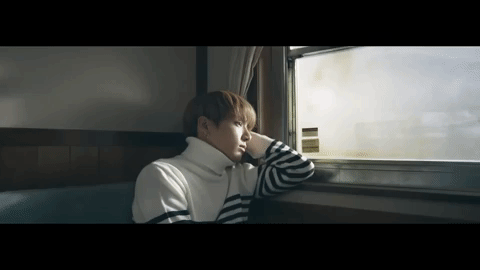
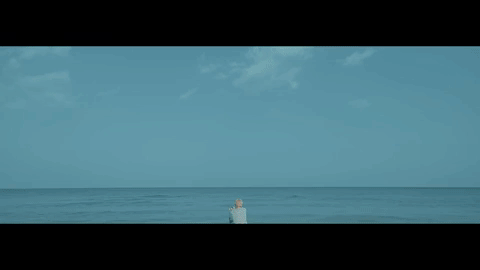


From Muish: Lit. “I yearn to see you.” Also: Even in the Japanese release of the song, the line is translated as “I want to see you.”
From Muish: “The ‘your‘ photos here is plural. It’s like ‘Even while looking at you guys’ photos, I still miss you.’ I guess that makes this part definitely not a break up song – not that it ever really was.”

From Wikipedia: "'The Ones Who Walk Away from Omelas' is a 1973 short story by American writer Ursula K. Le Guin. With deliberately both vague and vivid descriptions, the narrator depicts a summer festival in the utopian city of Omelas, whose prosperity depends on the perpetual misery of a single child."
From David Brooks (NYT): "In another reading, the whole city of Omelas is just different pieces of one person’s psychology, a person living in the busy modern world, and that person’s idealism and moral sensitivity is the shriveling child locked in the basement."
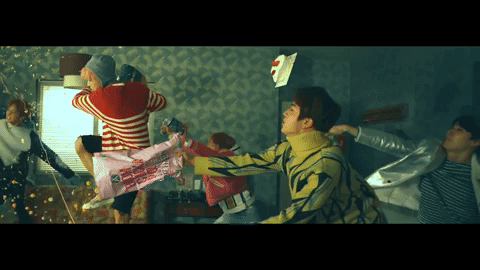
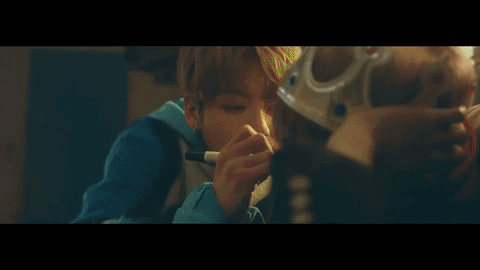


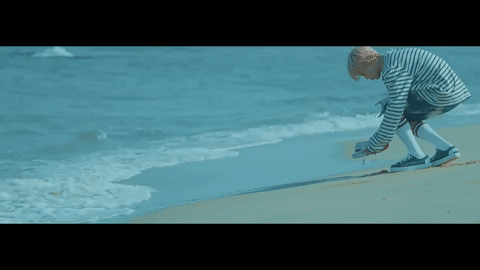
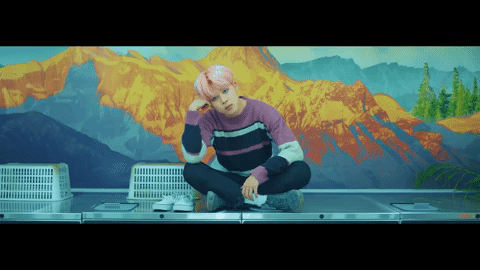

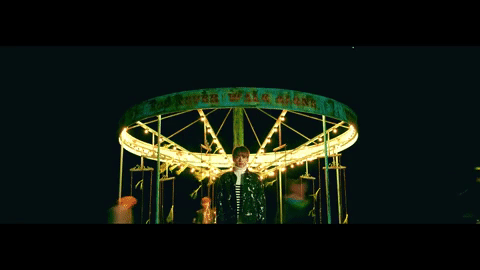
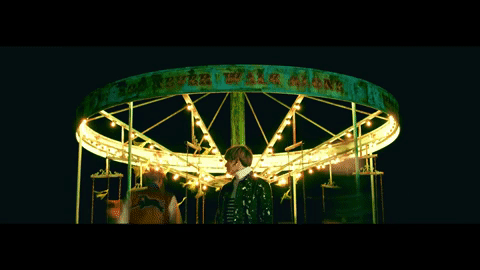



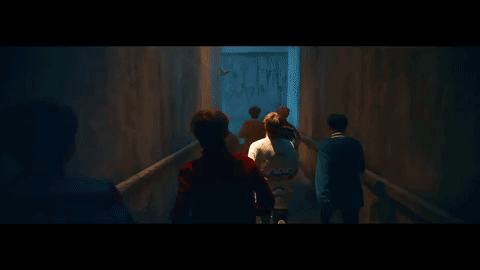
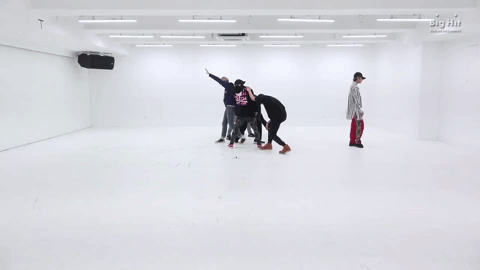
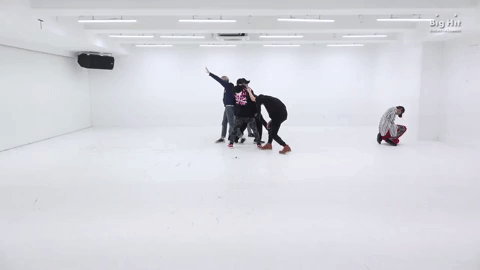
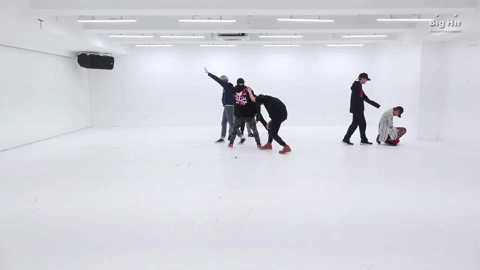
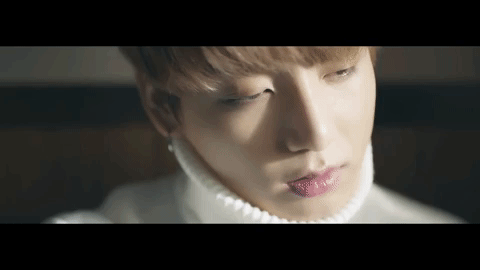
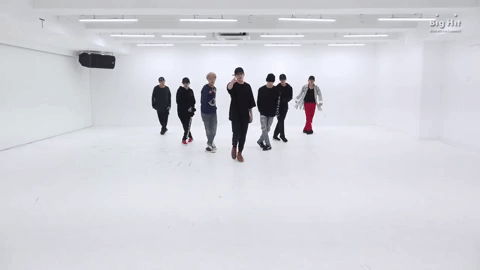
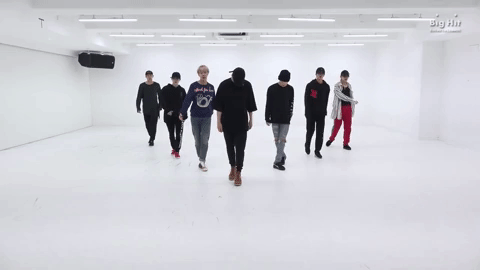
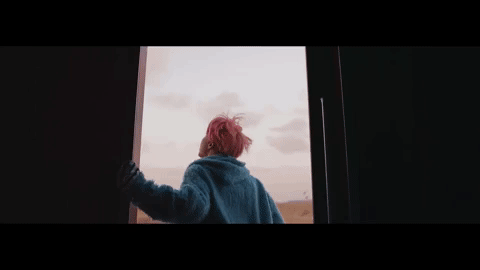
"Spring Day" was the first K-pop song to break the top 10 on iTunes US.
